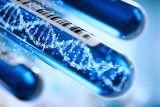A research team led by Yanfen Hu, PhD, professor of anatomy and cell biology at the George Washington University (GW) School of Medicine and Health Sciences and a member of the GW Cancer Center, is studying the role of the tumor suppressor BRCA1 in the homologous recombination pathway of DNA double-strand break repair.

“Our work seeks to validate a previously unrecognized role of BRCA1 in licensing the commitment step in homologous recombination [a type of high-quality repair machinery that faithfully repairs DNA double-strand breaks],” said Hu. “This challenges the current view of BRCA1 as merely a scaffolding protein.”
Based on preliminary data, the team hypothesizes that BRCA1 modifications are part of a licensing mechanism that senses the damage, but manages to time the repair to that window of high-quality repair. Interestingly, both nuclease recruitment and inhibition are part of the timing control strategy. They also propose that BRCA1 homologous recombination repair activity is particularly important for genetic integrity of luminal genes in luminal cells of breast tissue, where many BRCA1-associated tumors originate.



